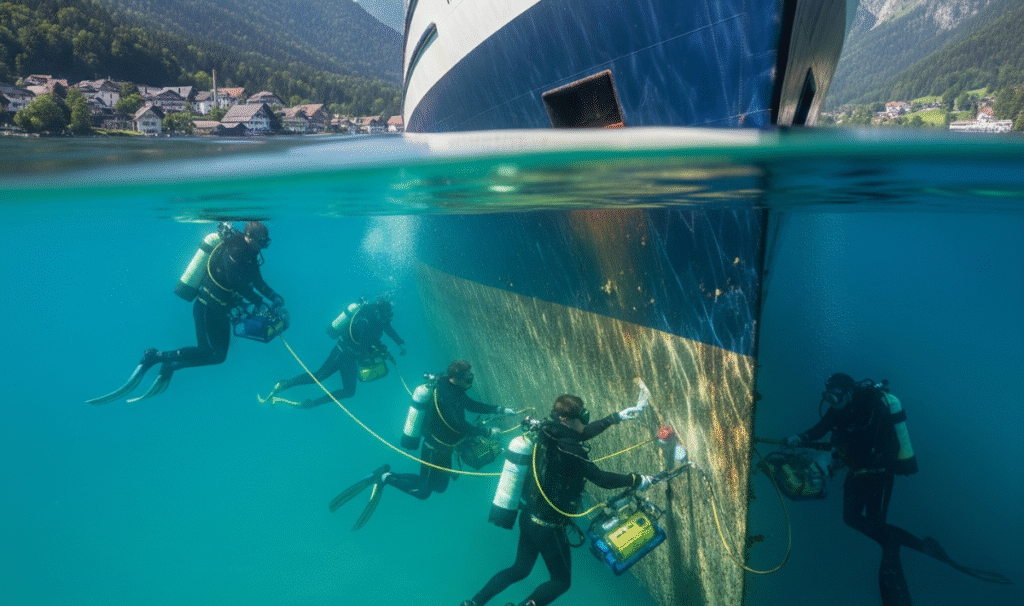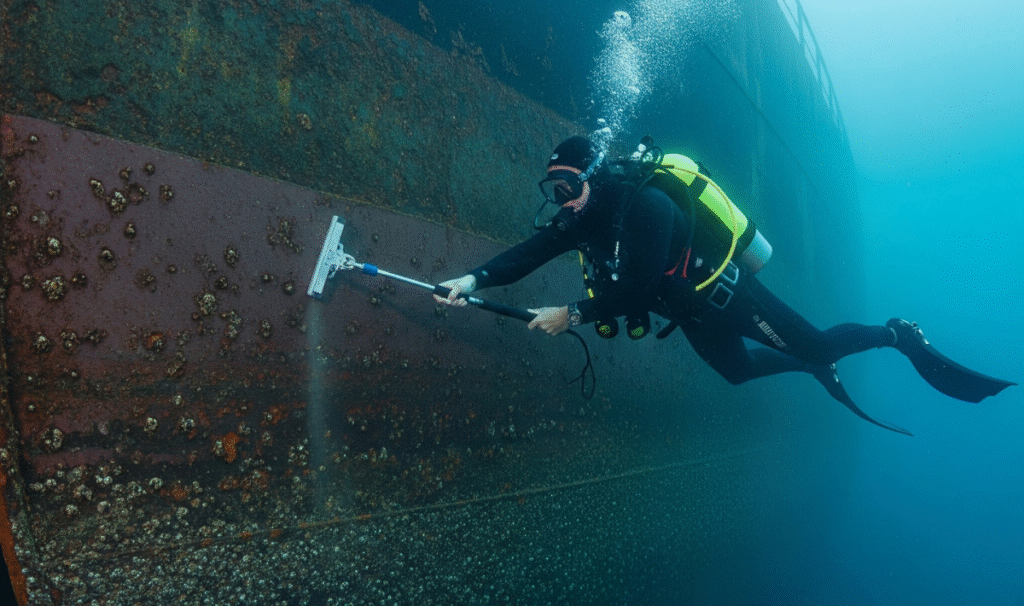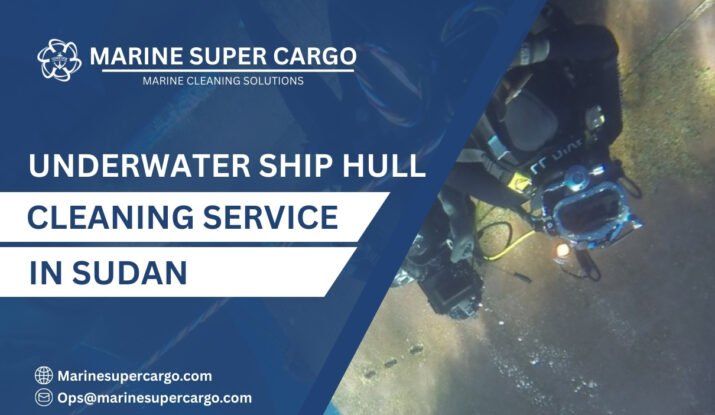Imagine steering a boat through water with weeds tangled beneath it—it drags, resists, and wastes energy. Ships face a similar battle when barnacles, algae, and marine growth cling to their hull. This buildup is called biofouling, and it quietly eats away at efficiency, fuel, and money. That’s where underwater ship hull cleaning in Sudan comes in. Sudan’s strategic Red Sea ports make this service more than upkeep—it’s a vital part of keeping vessels profitable, eco-friendly, and seaworthy.
What is Underwater Ship Hull Cleaning in Sudan?
The Basics of Hull Maintenance
The basics of hull maintenance revolve around keeping a vessel’s submerged surfaces clean and efficient. Over time, marine organisms such as barnacles, algae, and slime accumulate below the waterline, creating drag that increases fuel use and accelerates corrosion. Hull cleaning is the process of removing this growth, along with debris and early signs of deterioration, to restore smoothness and performance. While traditional methods once demanded costly and time-consuming dry-docking, modern advancements now make in-water cleaning possible. With skilled divers and specialized equipment, ships can be cleaned underwater quickly, safely, and economically, minimizing downtime while maximizing operational efficiency and lifespan.
Why Sudan’s Location Makes Hull Cleaning Critical
Positioned along the Red Sea, Sudan is on a shipping lane connecting Europe, Asia, and Africa. With rising port activity, underwater ship hull cleaning in Sudan ensures vessels passing through operate efficiently within this busy maritime corridor.

How Biofouling Slows Ships
A ship coated in barnacles is like a swimmer wearing heavy boots. It moves more slowly, feels resistance, and burns more energy. Research by imo.org shows fouling can cause ships to consume up to 30–40% more fuel than necessary.
Fuel Cost Savings from Clean Hulls
Regular underwater ship hull cleaning in Sudan helps shipowners cut fuel consumption by minimizing drag and resistance. A clean hull ensures vessels move smoothly through the Red Sea, reducing engine strain and operational expenses. These savings not only improve profit margins but also enhance voyage reliability, speed, and on-time delivery performance for global shipping routes.
Stopping the Spread of Invasive Species
Ships that travel across oceans often carry stowaway organisms on their hulls. When released into new seas, these can disrupt local marine ecosystems. The International Association of Ports and Harbors emphasizes that in-water cleaning plays a key role in halting this biological “hitchhiking.”
Following MARPOL and IMO Guidelines
The MARPOL Convention and IMO regulations require vessel operators to reduce pollution and manage biofouling responsibly. Choosing underwater ship hull cleaning in Sudan means shipowners stay compliant while supporting global sustainability goals.
Preventing Corrosion and Long-Term Damage
Marine growth not only slows ships but also traps moisture, accelerating corrosion. Regular underwater ship hull cleaning in Sudan protects the vessel’s metal surfaces and paints, preventing premature aging and structural damage.
Lowering Repair and Dry Dock Expenses
By addressing fouling early, shipowners minimize the frequency of costly dry-docking and emergency repairs. In-water solutions save time and money while extending the ship’s productive lifespan.
Tools and Methods Used Underwater
Modern cleaning involves everything from rotating brushes and hydraulic scrubbers to eco-friendly pads and magnetic crawlers. Some advanced systems, as highlighted by cleanship.co, even vacuum debris to prevent contamination.
Global Safety Standards and Compliance
According to imca-int.com, professional hull cleaning follows strict international safety standards. Divers in Sudan apply these same global protocols, ensuring effective and risk-free cleaning underwater.
Geographic Importance of the Red Sea
Sudan’s Red Sea coastline places it on one of the most vital maritime highways in the world. Ships traveling between the Suez Canal and the Arabian Sea make stops here, making underwater ship hull cleaning in Sudan a practical service for passing fleets.
Ports, Trade Routes, and Maritime Growth
Sudan’s port cities are rapidly modernizing, boosting their role in African trade. As shipping traffic grows, so does the demand for efficient in-water maintenance services.
Concerns About Marine Life Safety
Some assume scrubbing hulls harms marine ecosystems. In reality, regulated underwater cleaning reduces the transfer of invasive species and promotes healthier local seas.
Myths About Damage to Anti-Fouling Coatings
When done professionally, hull cleaning protects coatings instead of stripping them. Shipowners opting for underwater ship hull cleaning in Sudan can rest easy knowing that modern equipment preserves their investments.

How Often to Schedule Hull Cleaning
The frequency of hull cleaning depends largely on sailing routes and water conditions. Vessels navigating warmer waters, such as the Red Sea, are more prone to rapid marine growth and biofouling. To maintain peak efficiency, fuel savings, and compliance, shipowners should schedule underwater ship hull cleaning every 4–6 months, ensuring smooth, reliable, and cost-effective voyages.
Choosing Safe, Certified Professionals
Always verify divers follow IMO and IMCA guidelines, and that they use eco-friendly cleaning methods. This ensures results that are both effective and environmentally responsible.
Conclusion
At the end of the day, a fouled hull drags down profits, efficiency, and environmental responsibility. The three big wins of underwater ship hull cleaning in Sudan are crystal clear: smooth sailing with less fuel, healthier oceans with fewer invasive species, and reduced long-term costs with extended vessel life. Sudan’s position on the Red Sea only amplifies the importance of this service. For shipowners, it’s not an optional chore—it’s a smart, strategic move toward sustainable and profitable operations.
FAQ:
Q1. How often should I schedule underwater ship hull cleaning in Sudan?
Generally, every 4–6 months, depending on biofouling growth, vessel type, and water conditions.
Q2. Is underwater ship hull cleaning in Sudan cost-effective compared to dry docking?
Yes. It minimizes downtime and avoids unnecessary dry dock visits while maintaining hull efficiency.
Q3. Does underwater cleaning damage protective coatings?
Not when carried out by certified professionals. Specialized tools are designed to be gentle on coatings.
Q4. Why is Sudan considered an important location for hull cleaning?
Its Red Sea ports lie on a global shipping route, making it a convenient and strategic stop for ship maintenance.
Q5. How does underwater hull cleaning support environmental protection?
It prevents invasive species transfer, reduces drag-related fuel emissions, and ensures vessels comply with MARPOL and IMO regulations.


